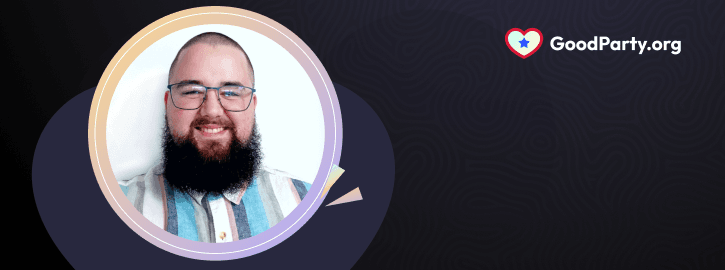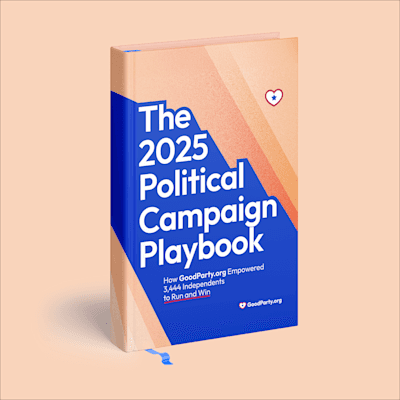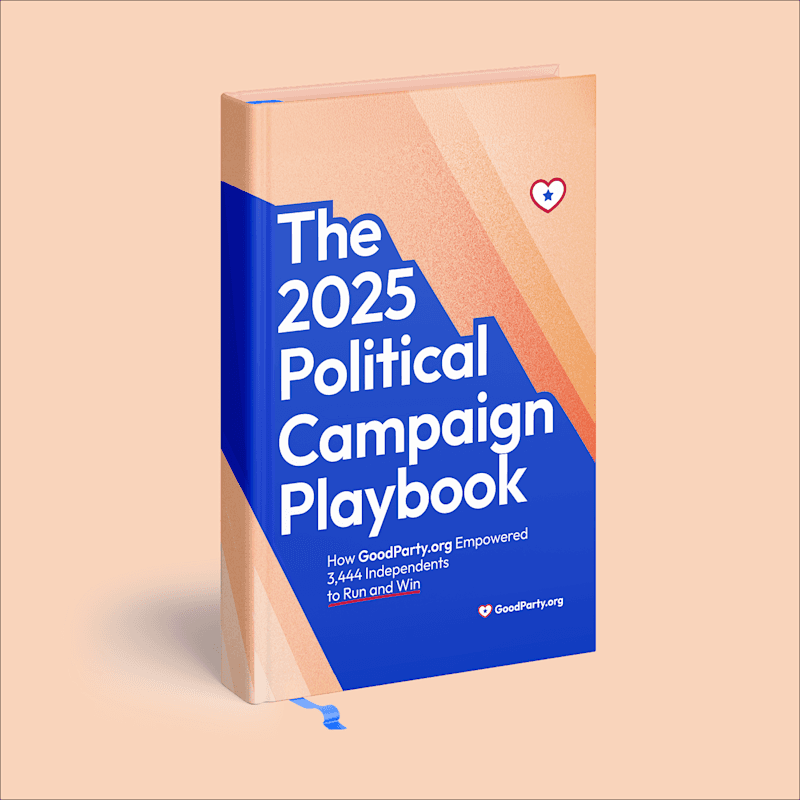
Meet Jo Zichterman, an Independent for Cowlitz County Commissioner
Jo Zichterman is an independent, GoodParty.org Certified candidate for county commissioner in District 2 of Cowlitz County, Washington. On Tuesday, August 6, 2024, Zichterman will appear on the ballot in the primary election.
GoodParty.org spoke with Zichterman about his campaign’s priorities and how he hopes to engage more voters in the primary election.
Jo Zichterman: An Independent Candidate for Cowlitz County
Cowlitz County is located in southwestern Washington, along the state’s border with Oregon. The Cowlitz County Board of Commissioners represents three districts. District 2, which Zichterman hopes to represent, is the smallest of the three districts geographically and includes the cities of Longview and Kelso.
Zichterman has lived in the area for about three and a half years. During that time, he has worked as a technical consultant.
“I meet with people and talk to them about how complex systems work and how they can get what they want from them,” Zichterman said. “A lot of my skill set has been based around communicating complex ideas, helping to take things down to a lower level so that we can bring more people in. The main reason that I decided to run for office was to that end; it was to try to communicate with people in the ways that I felt like I wanted to be communicated to in a political context.”
Encouraging Active Citizenship in Cowlitz County
Prior to running for office as an independent candidate, Zichterman used to be a member of the executive board for the Washington State Democratic Central Committee. He said his political ideology has evolved over time, from growing up in a conservative household to holding more progressive views.
Now, Zichterman identifies as an independent — in part because he strives to represent all Cowlitz County residents, not just the members of one political party.
As a candidate for county commissioner, Zichterman has been vocal about encouraging civic engagement and making sure all residents’ voices are heard.
“I'm very frustrated by how our generation and generations younger than us are disconnected from the process of politics, of deciding how we want our society to work,” Zichterman said. “We say that we want people to get involved, but when new people enter spaces and disagree about how things should be done, or when they have different ideas about the way things are supposed to work, they get shot down because they're not proven.”
Zichterman said the two-party system has created barriers to more active civic participation.
“This is part of the reason I decided to run as an independent, because I'm very frustrated by the party structure. It feels to me like it weighs us down in a lot of ways,” he said. “There is an advantage in collaboration, but we are really talking about big institutions, and in my experience, institutions rarely get anything novel done.”
One of the ways Zichterman is working to make civic engagement more accessible is by educating voters about the role of a county commissioner.
“I talk about county commissioners and I'm like, ‘Look, it's like a CEO for a company, except you're doing it for a county government, and instead of one person, it's a board of three. They make all the same kinds of decisions that a CEO might. They budget, they talk with their directors, and they help direct what their day-to-day activity is going to look like. They try to set some strategic priorities. These are not foreign concepts to us,’” Zichterman said.
Zichterman has also been intentional about reaching out to younger voters, who are typically less likely to vote. He noted that while he was involved with Washington’s Democratic Party, he often felt frustrated by the lack of innovation in reaching younger voters.
“What I've recognized is that the attitude people have towards folks who they feel are checked out, is really negative. They don’t believe that those people — the people who feel the way that we do and that are frustrated with this whole system — are worthy of engaging with,” Zichterman said.
For example, many Democratic campaigns specifically target Democratic voters, instead of engaging with the broader electorate. Zichterman said this practice can leave independent voters feeling excluded and unheard.
Instead of assuming that some voters are simply apathetic, Zichterman said it’s important to analyze why people choose not to engage in traditional politics and elections.
“The marketing person in me says that people don't check out out of apathy. It's usually because they don't see a straight line between getting involved and getting something that they want,” he said. “Somebody saying, ‘I'm not interested,’ is to me saying, ‘I can't connect your activity to something that benefits me.’ A second group says, ‘I didn't vote because I won't vote for the lesser of two evils, and there's nobody on the ballot talking about anything that I care about.’”
Zichterman said he hopes to connect with both groups of voters by raising awareness about the role of local government and offering voters another option outside of the two-party binary.
He noted that there is another group of unengaged voters, who believe the political system is broken beyond repair.
“There is a small subset of people who genuinely believe that we are lost, that the system is broken and there's nothing we can do about it, and we would really be better off if we just did a hard reset,” Zichterman said. “I kind of used to feel that way, too, until I started doing research into the attitudes of the Framers. I started reading writings from Alexander Hamilton, James Madison, and John Jay, the Federalist papers. I started to recognize how much of this system was built to accommodate these problems but how far we've split from what was described and, in fact, how many warnings we got at the very beginning of the United States’ founding that partisanship was going to hurt us.”
Studying the early years of American government has given Zichterman hope that the current system can be reformed.
“What I've seen since I started to study is that actually, there is a path to fix things, but the path to fix things probably means getting away from this two-party binary. If we don't do that, we're going to get stuck in this race with two groups who are just not really all that interested in modernizing,” Zichterman said.
Running an Authentic Political Campaign for Commissioner
On the ballot for county commissioner are three Republican candidates, one Democratic candidate, and two independents, including Zichterman. Zichterman said the two major parties in Cowlitz County have been quite hostile toward one other.
“It's not quite that they're yelling at each other across the street or anything like that, but I've been in both rooms and I hear very similar rhetoric from both groups,” he said. “I think both groups feel they are in the majority and that the other side is misrepresenting themselves as the majority.”
Zichterman said he has faced animosity since resigning from the Democratic Central Committee to run as an independent. However, being able to run for office according to his own values has been worth the negative response from local Democratic leaders.
“For me, it was much more important that I run a campaign that is authentic than it is that I win an election. I don't want to win something and have to sacrifice parts of myself to do it,” Zichterman said.
Transparency is an important element of running an authentic campaign for Zichterman.
“If you look at everything that's on my YouTube channel or if you look at what's on my TikTok, it is all about being exactly who I am and trying as best I can to not sacrifice parts of myself just because of the space that I'm in,” Zichterman said.
Zichterman said it is important to him that voters can understand his motivation for running for office and how he is going to work to do the right thing for Cowlitz County.
Addressing Local Needs and Planning for the Future
Zichterman has identified three key areas where he hopes to make change as county commissioner.
The first area is in addressing Cowlitz County’s basic needs and ensuring that all residents have access to clean water, food, and shelter. This includes increasing the number of affordable housing options available in the community.
Second, Zichterman hopes to collaborate with county directors and community leaders to create a 10-year strategic plan for Cowlitz County.
“Putting together a plan that accounts for all of the cities in our county but also all the unincorporated areas, and tries to set our sights on what 2037 is going to look like, that's pillar number two,” Zichterman said.
He said the county’s past leadership has resisted strategic planning, for fear of increasing the level of government influence in Cowlitz County.
“When your leaders are just not that interested in thinking about the future, and when your leaders think that government is bad and that anything we can do to reduce the influence of government is good, you're really not going to be thinking about what the impact on the community is. There's this rhetoric that somehow involving the state is inviting an influence into our community that will overtake us,” Zichterman said.
In the past, this fear has materialized in handing off some of the county’s responsibilities to private entities like nonprofits and churches.
“It's very frustrating for me to see that,” Zichterman said. “I don't want to point fingers, but I think it rests on the leadership here in the county, and that's one of the reasons why I feel motivated to run, because I think I can do a better job.”
The third area Zichterman hopes to address as county commissioner is in aligning the county’s development initiatives. This includes creating an inventory of all the existing efforts by nonprofits, city governments, and the county administration. Then, Cowlitz County can begin to coordinate its efforts more strategically and effectively.
“There are a lot of efforts happening in our community that are very disconnected from one another. There are nonprofits in our community right now that are both trying to address homelessness and are fighting with each other,” Zichterman said. “I've literally been told, ‘If you go meet with this nonprofit, don't bring up that one, because they don't like each other.’ Why in the world are we arguing with each other? We are all trying to address the same problem.”
Zichterman said that the five incorporated cities within District 2 tend to act as siloes, instead of working together. In some areas, the cities even compete with one another instead of collaborating.
“This is kind of the way that you solve problems in business,” Zichterman said. “You think about the problem, and then you inventory all the solutions that are available. Then you pick solutions that are available, you try them, and you see how well they work. That's the core of it for me. I have a lot of trouble with the more generic messaging that tends to show up in these spaces, with people talking about improving quality of place, but then they're not listing out the things that it's possible to do.”
By contrast, Zichterman hopes to make his campaign goals as practical and straightforward as possible.
“My messaging has been very focused on addressing basic needs, developing a strategic plan, and then aligning our existing efforts. I try not to make it more complicated than that, and I try really hard to stay away from the political jargon, because I think it just gets frustrating,” he said.
How to Get Involved in Cowlitz County, Washington
The primary election on August 6, 2024 is less than a week away, but there’s still time to make an impact in Cowlitz County, Washington.
Here are a few tips for making a difference locally:
Get ready for election day on August 6, 2024. Find the information you need on Cowlitz County’s website, including a sample ballot and lists of important dates and deadlines.
Prepare for the general election. After the primary election, the top vote-getters in the race for Cowlitz County Board of Commissioners will move onto the general election. Even if you’ve missed the deadline to register to vote or cannot participate in the primary election, there’s still time to make your voice heard in November.
Volunteer. Consider volunteering with a local campaign, or with a national organization like GoodParty.org. Learn more about how you can support Jo Zichterman’s campaign here, or learn how you can volunteer on behalf of independent candidates across Washington here.
Want to see more spotlights on GoodParty.org Certified candidates? Explore our full collection of candidate spotlights here.

